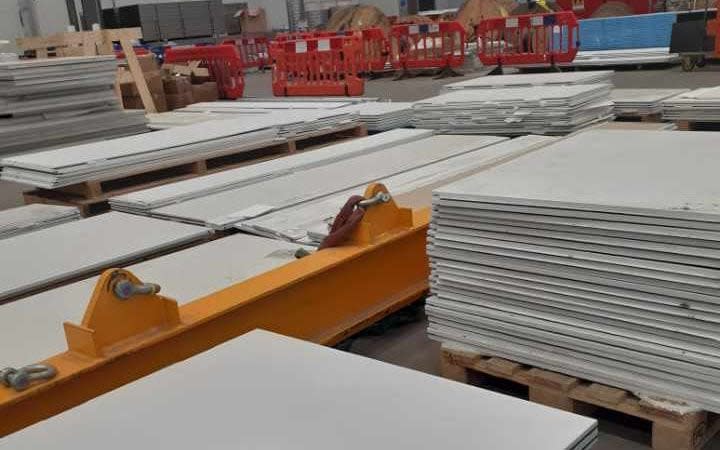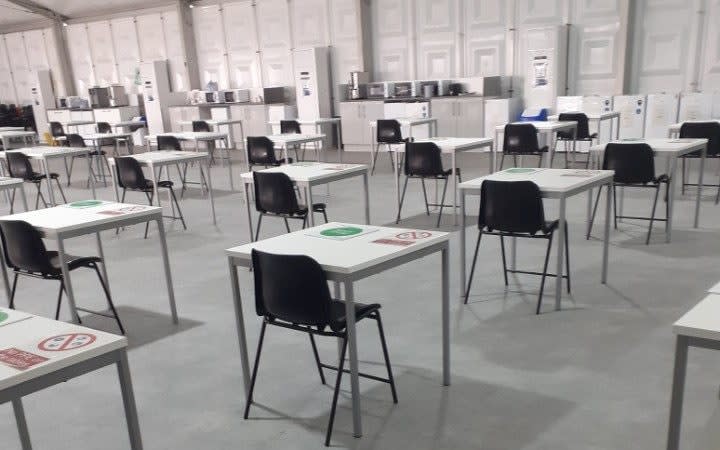Exclusive: Covid testing mega lab operating at less than 10 per cent capacity

A mega lab hailed by Matt Hancock as "future-proofing" Britain against pandemics is running at less than 10 per cent capacity, The Telegraph can reveal.
The delay is fuelling a shortage of PCR test capacity – a concern partly to blame for ministers only planning to lift self-isolation for those who are fully vaccinated from August 16, it is understood.
The Rosalind Franklin Laboratory, in Royal Leamington Spa, opened last week and is expected to process thousands of tests each day. Announcing the facility in November, Mr Hancock, the former Health Secretary, said it was "future-proofing our national infrastructure to respond to future epidemics".
But it has emerged that the mega lab, which has so far only hired 300 of the 1,500 staff required to run it, is operating at eight per cent capacity. Only one processing line out of the 12 originally planned is currently open, multiple sources confirmed to The Telegraph.
Another three have been built and handed over to laboratory staff but are yet to start processing tests, and construction on five further labs is under way. But plans for the other three have been shelved completely, sources said, leaving a space the size of "a car park" in the middle of the facility.
"This will not be open fully this side of Christmas," one source said. Another said the facility still resembled a building site and staff were instructed to wear "steel-capped boots" along with their personal protective equipment.
As Covid cases continue to rise, topping 50,000 over the weekend, the public have struggled to book tests – the official means of confirming a positive Covid case.
Parents at more than 400 schools in Staffordshire were informed that there was no availability for PCR tests, expected to last over the weekend, "as the national system has run out of lab capacity", a letter from Staffordshire County Council said.
The proportion of tests taken at in-person sites and returned within 24 hours – Boris Johnson's pledged target time – dropped by more than 10 per cent in the week ending July 7, according to the latest NHS Test and Trace figures.
Delays within the national testing system are likely to have a knock-on effect on the economy, which is already struggling after thousands of workers were pinged by the NHS Covid app. Employees experiencing Covid symptoms are advised to isolate immediately but can be released if a PCR test shows they are negative.
Concerns over potential PCR shortages also appear to have influenced the decision to delay releasing double vaccinated people from self-isolation until August 16.
The Telegraph has been told that in recent papers submitted to the Covid-O Cabinet sub-committee, the need to "mitigate" the risk to PCR capacity was one of the reasons given for keeping the rules in place until August.
Matt Western, the MP for Warwick and Leamington, said the mega lab project has been "no triumph" for the Government, adding that "most of the facility is essentially an empty warehouse".
"The lab has been shrouded in secrecy, delayed for six months," he said. "And all at a time when testing capacity desperately needs to be scaled up across the UK."

Questions have also been raised about the skill level of the lab workers, as one expert source claimed there was no clinician who is a trained microbiologist or biologist overseeing the processing.
Engineers have been called in frequently to the site because staff keep "breaking the robots" that process the swabs, sources have claimed. "When you load them it's a bit like when you load a CD, and if you imagine people pulling out CD drives that's how it will break [and] yes, that did happen a lot," one said.
"The problem with this machine breaking is that people do it out of impatience because they've got targets they want to hit, and they're pulling things out to speed up the process."
David Wells, the chief executive of the Institute of Biomedical Science, said: "Any workforce undertaking diagnostic testing for Covid-19 should meet the same minimum requirements as any other medical laboratory workforce that is involved in diagnostic testing.
"It is essential that the staff at the Rosalind Franklin Laboratory are a highly skilled and regulated professional workforce, in numbers adequate for the site to function safely."
Dr Colin Fink, the medical director of the infectious disease rapid diagnostic company Micropathology, said his offer to oversee the running of the facility had been turned down.
He added that naming the facility after Rosalind Franklin, a renowned chemist, was a "travesty" and said: "I'm quite certain she would have been appalled to have her name attached to this second-rate set-up."
The Department of Health and Social Care (DHSC) did not respond to requests for comment before publication. It is currently unclear how many tests the site is processing per day.
DHSC said the Rosalind Franklin would have a flexible testing infrastructure to allow it to respond to surge testing demands. They said further lab lines would be added over the coming weeks and denied some of the lines had been cancelled.
A spokesperson said: “The Rosalind Franklin laboratory is being managed by world-leading scientists with decades of experience, and by building it in sections we are ramping up testing capacity while construction continues. Once fully operational this laboratory will process hundreds of thousands of COVID-19 samples every single day, as well as detecting and monitoring variants of concern using genotype assay testing and genome sequencing."

